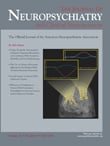To the Editor: Acute dystonic reactions are well recognized, but isolated dystonia of the pharyngeal muscle causing dysphagia is a rare occurrence with neuroleptic drugs. Extended-release paliperidone is a newly introduced atypical antipsychotic medication formulated using the principal active metabolite of risperidone, 9-hydroxyrisperidone. In contrast to risperidone, it provides consistent and smooth plasma drug concentrations over 24 hours.
1 We report a young man who developed acute-onset dysphagia after taking paliperidone.
Case Report
Mr. S, an 18-year-old male student, presented with a history of being suspicious, irritable, withdrawn, muttering to self, and having grandiose ideas and disturbed biological functions for a duration of 1 year. He was diagnosed with schizophrenia (DSM-IV-TR criteria). He was treated with divalproex sodium, 750 mg/day, olanzapine, 30 mg/day, and clozapine, 100 mg/day, with marked recovery in psychotic symptoms. He remained stabilized for 3 months while continuing the same treatment. Subsequently, he stopped taking medicine and had a relapse within 2 weeks. This time he was treated with divalproex sodium, 500 mg/day, and paliperidone, 3 mg/day. At day 3, the dosage of paliperidone was increased to 6 mg/day. After taking only two doses of paliperidone at 6 mg/day and within 12 hours of his last dose of paliperidone, he started complaining of a choking sensation in his throat if he tried to ingest any solid or semisolid food and made gurgling sounds. He had little difficulty taking liquids, but solid food would stick in his throat. He presented with severe anxiety and was calling for help. By the time he was brought to the treating psychiatrist, within 4 hours, he also had difficulty making sounds of any kind.
Neurological examination did not show any evidence of organic illness, and no abnormal movements were noticed on other parts of the body. He was given intramuscular promethazine, 50 mg, and within 30 minutes he showed remarkable recovery in swallowing. Otolaryngological and gastroenterological evaluation did not find any organic causes and confirmed a case of drug-induced dysphagia. His organic workup for dystonia, including EEG and brain MRI, was negative. Paliperidone was replaced by clozapine, 200 mg/day, with no further recurrence of dysphagia.
Discussion
The association between paliperidone and dystonic dysphagia is irrefutable in this report; the complaints developed shortly after the introduction of paliperidone and resolved with an anticholinergic drug. Dysphagia may be a manifestation of extrapyramidal side effect when it is associated with neuroleptic therapy.
2 Literature shows that patients with dystonic dysphagia frequently have oromandibular dystonia or neck dystonia,
3 but in our case it was an isolated phenomenon. The mechanism of action of paliperidone is unclear. Paliperidone may cause dystonia due to its dopamine D
2 -serotonin 5HT2A antagonist property.
1 Further, it can block alpha 2 adrenoceptors which can increase noradrenergic activity by inhibiting the autoreceptors.
4 Animal study has suggested that enhanced activity of central noradrenergic nuclei is one of the pathophysiologies of dystonia.
5Complaints of dysphagia in patients with schizophrenia are often overlooked, and this report shows that early diagnosis of neuroleptic-induced dysphagia can avoid potential complications and prevent the patient from undergoing extensive diagnostic testing and various drug trials.

